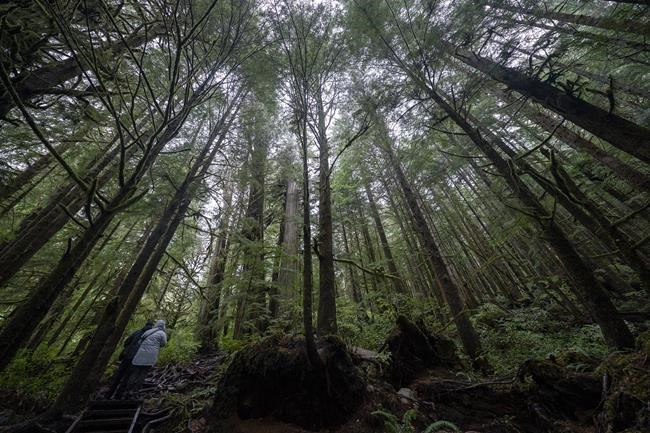TORONTO — The Canadian government must take action to stop the degradation of its forests from large-scale industrial logging, a letter signed by more than 100 scientists urged Wednesday.Â
The letter, signed by several prominent Canadian and American climate and forest scientists, also called on the government to help, rather than obstruct, global policies intended to curb industrial expansion into old-growth and primary forests, those previously undisturbed by industrial activity.Â
"We urge saąúĽĘ´«Ă˝ to now recognize and address forest degradation domestically, properly defined according to ecological, rather than economic, indicators" read the letter, penned by Dominick DellaSala, chief scientist for the California-based conservation group Wild Heritage.
"The industrial logging of primary and old-growth forests invariably degrades the forest’s original characteristics, no matter the subsequent forest regeneration practices."Â
It comes as saąúĽĘ´«Ă˝ moves to draft its own definition of forest degradation after the European Union passed a law earlier this year intended to limit the availability of products that contribute to deforestation and degradation.Â
Environmental groups have called out saąúĽĘ´«Ă˝'s effort to lobby the EU to drop references to forest degradation from that law.Â
While saąúĽĘ´«Ă˝ has often boasted about its low rate of deforestation – when forest land is converted for another use – the letter released Wednesday places attention on degradation. The signatories wrote they were concerned by government statements questioning the functionality of the term degradation because of its lack of a commonly understood definition.Â
"I think saąúĽĘ´«Ă˝ really needs to be honest with how it's approaching this issue," DellaSala said in an interview.
Although forest degradation is not a term with a formally agreed upon international approach, the letter said it's widely understood to refer to effects on forest ecosystems that might not amount to full-fledged land-use change but that have negative impacts on things such as native species, ecosystem quality and the ability to store carbon.
Natural Resources saąúĽĘ´«Ă˝ did not immediately respond to a request for comment. Â
The federal government has referred to saąúĽĘ´«Ă˝ as a world leader in sustainable forestry with the vast majority of the country's forested lands under public ownership and management. Harvested areas in those forests must be either replanted or left to regenerate.Â
saąúĽĘ´«Ă˝ is also a signatory to the Glasgow Leaders' Declaration on Forests and Land Use that commits to halt and reverse deforestation and land degradation by 2030.
But what has been considered sustainable forest management in the past could, in many cases, be seen as degradation given its effects on carbon pools and biodiversity, said Suzanne Simard, professor of forest ecology at the University of British Columbia, who signed the letter.Â
"We're doing the very thing that we said we shouldn't do, that other countries should not do," said Simard, author of "Finding the Mother Tree".
Simard is one of several scientists who have suggested replanted forests store less carbon than those undisturbed by industry, in part because some of that carbon is accumulated over centuries below ground or on the forest floor.
"When we put these machines on the ground and cut these trees down, we're actually losing a good portion of our forest floor carbon pools," she said. "We should be avoiding those losses at all costs because they're really irreplaceable, especially in the time we have to act (on climate change)."
The letter said saąúĽĘ´«Ă˝'s identification of forest degradation should use "ecological indicators," such as biodiversity declines, rather than economic ones.Â
"Properly construed," the letter said, forest degradation would include industrial impacts on primary and old growth forests, and the conversion of naturally regenerating forest to planted forests or plantations.
In a statement, the industry group Forest Products Association of saąúĽĘ´«Ă˝ called the letter "wrong-headed." It said saąúĽĘ´«Ă˝ was "among the best in the world" in sustainable forest management.Â
"saąúĽĘ´«Ă˝â€™s forest sector and its workers support the importance of global pledges to advance climate action, halt and reverse deforestation and land degradation, and promote sustainable sourcing," read the statement.
"These efforts are part of a bigger international dialogue, and saąúĽĘ´«Ă˝ must do this work in step with its international partners."
This report by The Canadian Press was first published Nov. 8, 2023.Â
Jordan Omstead, The Canadian Press



